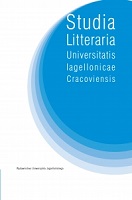De la mélancolie et son expression stylistique dans quelques Chansons spirituelles de Marguerite de Navarre
On Melancholia and its Stylistic Rendering in a few of Marguerite de Navarre’s Chansons spirituelles
Author(s): Brenda Dunn-LardeauSubject(s): Cultural history, Studies of Literature, French Literature, Health and medicine and law, 15th Century, 16th Century
Published by: Wydawnictwo Uniwersytetu Jagiellońskiego
Keywords: Marguerite de Navarre; melancholia; Chansons spirituelles; humoral medicine; Imitation of Christ; Petrarch; dolce pena;
Summary/Abstract: This article examines melancholia and its stylistic rendering in three of Marguerite de Navarre’s Chansons spirituelles that do not deal with bereavement, namely Songs 29, 45, and especially 34. The Queen uses various medical, philosophical, and literary sources to describe melancholy, although she never quotes Aristotle or humoral medicine. The same applies to literary borrowings from the Imitation of Christ, which enable her to give a willful Christian response to life’s sufferings. Most of all, Marguerite spiritualises love motifs used by Petrarch in his Canzoniere, especially the dolce pena concetto. This is achieved thanks to the interpenetration of Petrarch’s amorous vocabulary with the inner life discourse of her characters’ souls, tossed between euphoria and suffering, in their quest for divine love. This study also reviews Marguerite’s use of melancholia in La Coche, la Comédie des quatre femmes and l’Heptaméron, where it remains in the realm of worldly concerns and raises moral and ethical questions.
Journal: Studia Litteraria Universitatis Iagellonicae Cracoviensis
- Issue Year: 17/2022
- Issue No: 2
- Page Range: 75-86
- Page Count: 12
- Language: French

